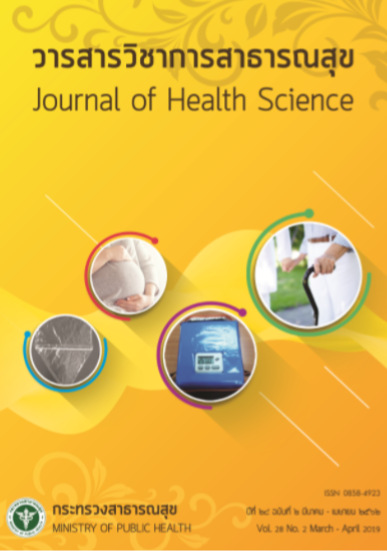ผลของรูปแบบการดูแลผู้ป่วยโรคหลอดเลือดสมองแตก ในระยะกึ่งวิกฤตต่อความก้าวหน้าในการปฏิบัติกิจวัตรประจำวันของผู้ป่วย
คำสำคัญ:
ผู้ป่วยโรคหลอดเลือดสมองแตก, การดูแลในระยะกึ่งวิกฤต, ความสามารถในการทำกิจวัตรประจำวัน, ความพึงพอใจบทคัดย่อ
การศึกษานี้เป็นงานวิจัยเชิงกึ่งทดลอง มีวัตถุประสงค์เพื่อศึกษาเปรียบเทียบผลของรูปแบบการดูแลผู้ป่วยโรคหลอดเลือดสมองแตกในระยะกึ่งวิกฤตต่อความก้าวหน้าในการปฏิบัติกิจวัตรประจำวันของผู้ป่วย และความพึงพอใจของเจ้าหน้าที่ ผู้ป่วย ญาติผู้ดูแล โดยใช้กรอบแนวคิดทฤษฎี Neuroplasticity และรูปแบบการดูแลผู้ป่วยโรคหลอดเลือดสมองขององค์การอนามัยโลก ภายใต้กระบวนการพยาบาลในการพัฒนารูปแบบการดูแลผู้ป่วย กลุ่มตัวอย่างได้แก่ ผู้ป่วยโรคหลอดเลือดสมองแตกจำนวน 60 ราย เป็นกลุ่มทดลองจำนวน 30 ราย และกลุ่มควบคุมจำนวน 30 ราย เลือกกลุ่มตัวอย่างแบบเฉพาะเจาะจง และมีการเปรียบเทียบความแตกต่างของกลุ่มตัวอย่างทั้งสองกลุ่มด้วยสถิติ Independent t-test พบว่ากลุ่มทดลองและกลุ่มควบคุมไม่แตกต่างกันอย่างมีนัยสำคัญทางสถิติ ประเมินผลรูปแบบการดูแลฯ จากการตอบแบบสอบถามของผู้ป่วยโรคหลอดเลือดสมองแตกก่อน และในระยะ 2 สัปดาห์ และ 1 เดือนหลังได้รับรูปแบบการดูแลฯ วิเคราะห์ข้อมูลด้วยสถิติบรรยาย และสถิติวิเคราะห์ความแปรปรวนแบบวัดซ้ำ โดยประเมินความก้าวหน้าในการทำกิจวัตรประจำวันในระยะก่อนการทดลอง หลังทดลอง 2 สัปดาห์ และ 1 เดือน ผลการวิจัยพบว่า ผู้ป่วยกลุ่มทดลองมีคะแนนความก้าวหน้าในการทำกิจวัตรประจำวันในระยะสิ้นสุดการทดลอง 2 สัปดาห์ และ 1 เดือนสูงกว่ากลุ่มควบคุมอย่างมีนัยสำคัญทางสถิติ อย่างไรก็ตามความพึงพอใจของเจ้าหน้าที่ต่อรูปแบบการพยาบาลปกติ และรูปแบบการดูแลผู้ป่วยโรคหลอดเลือดสมองแตกในระยะกึ่งวิกฤตไม่แตกต่างกันในระยะติดตามผล 1 เดือน แต่ความพึงพอใจของผู้ป่วยและญาติผู้ดูแลระหว่างกลุ่มควบคุมและกลุ่มทดลองมีความแตกต่างกันอย่างมีนัยสำคัญทางสถิติ
Downloads
ดาวน์โหลด
เผยแพร่แล้ว
วิธีการอ้างอิง
ฉบับ
บท
การอนุญาต
ลิขสิทธิ์ (c) 2019 Journal of Health Science - วารสารวิชาการสาธารณสุข

This work is licensed under a Creative Commons Attribution-NonCommercial-NoDerivatives 4.0 International License.







